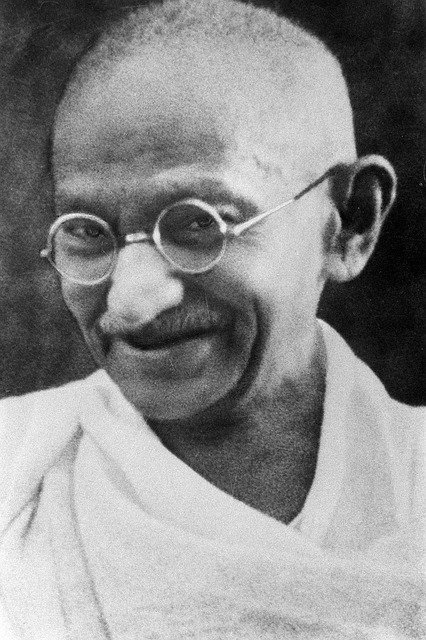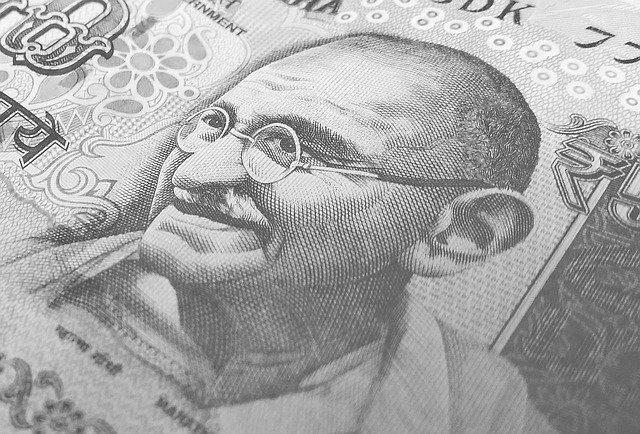Gandhi the Atypical Ascetic (Part 3): Taking the Brahmacharya Vow (SELF-control and SEXUAL Restraint)
“Fasting undertaken with a view to control the senses is, I have no doubt, very helpful…extinction of the sexual passion is impossible without fasting” (Gandhi 210).
This quote was taken from Gandhi's autobiography, and, indeed, expresses his ascetic nature.
Part III covers Gandhi's action in taking the Brahmacharya Vow- a vow of abstinence and release from sexual desire. Before exploring the third part of my essay, I would like to make a note on this quotation. I personally believe he thought fasting was necessary because hunger is always a more primitive desire than those of sex. If you are hungry, it is very unlikely you will crave sex as much.
If you missed Part 1 see below (also contains all sources of entire paper):
https://steemit.com/religion/@tfeldman/understanding-gandhi-as-an-atypical-ascetic-part-1
If you missed Part 2 see below:
https://steemit.com/religion/@tfeldman/understanding-gandhi-as-an-atypical-ascetic-part-2
Mahatma Gandhi: The Atypical Ascetic
Part III: The Brahmacharya Vow Transition State

While his early years showed “signs” of asceticism, the second portion of his life brought a more complete sense of ascetic values in the physical and psychological sense. This transformation would definitely lead to an ascetic life, but one that was uncharacteristic in spirit. Key factors in his early years contributed to his yearning for control over his carnal desires (see Part II); he did this by taking the Brahmacharya Vow.
When Gandhi pledged his Brahmacharya Vow in 1906, he did so in an ascetic fashion because his intentions were to suppress his desires in order to achieve a higher spiritual state. One should note that the Brahmacharya means self-control and sexual restraint (Ashe 92). Sexual restraint is a key word to focus on because it is more than mere abstinence and transcends into mental desires as well.
Geoffrey Ashe, who wrote a biography on Gandhi, describes that this particular vow is expressed in the Gita as well (93). Ashe also insists that Gandhi’s “aim in fact was not to mortify passion but to get rid of it… ordinary sexual resistance seemed to him insipid and animal like” (94). He did not appear to be avoiding sex just to have a better relationship with his wife, but he also felt that ceasing to have sex would enable him to become stronger spiritually by removing his animal passions. His sexual desires might have still persisted, but the vow he made put his wishes into action.
He was in his later thirties, and this was his time to think about ascetic values since his children were growing up (Gandhi 206). Because he had children, he thought that sex was not necessary anymore for reproductive purposes, and therefore, his attentions could be centered more towards the spiritual realm. When Ashe discusses how these ascetic ideals are expressed in the Gita, it shows that Gandhi was still following religious tradition. Gandhi also mentions this point in this life, which first-hand, presents his intentions in making the vow for a higher spiritual state. He insists,
“I must relinquish the desire for children and wealth and live the life of a vanaprastha—of one retired from household cares” (Gandhi 206).
There are two factors to note from his personal recollection. Firstly, his craving to leave the role of a “householder” expresses his drive to renounce his carnal desires for one of the spiritual realm. Secondly, this is a respectable path to take for a traditional Hindu. What can be more ascetic than theses two motives? He goes on further to say that “ whereas the bramachari uses it to see the glories of God, the other uses it to see the frivolity around him” (Gandhi 210). One might renounce bodily pressures to just gain perspective in a specific atmosphere, but for, Gandhi, it seemed to be for the “glories of God” and the chaos around him. This is very ascetic indeed, not just for his willingness to avoid sex, but also for perfecting his soul.
While sex was one action that was renounced in his daily life, many more ascetic implications came along with his never broken vow. One major example of this was his increasing want to simplify his food intake and even experiment with fasting. He notes in his autobiography that
“fasting undertaken with a view to control the senses is, I have no doubt, very helpful…extinction of the sexual passion is impossible without fasting” (Gandhi 210).
Although hunger fasts were not apart of his life at this point in South Africa, his experimentation with fasting was partly for religious purposes to strive for Moksha. When Cassian was mentioned earlier, the reoccurring theme of sexual restraint seemed to be centered on self-discipline of the mind. Gandhi as well seemed to be concerned with this ascetic goal because even when he was sexually abstinent after the vow, he also wanted to suppress his lustful appetite through experiments with limited food intake and fasting.
He also was not involved in hunger strikes at this period, which reveals his purely spiritual intention of action. After Gandhi made his vow of sexual restraint, the life of him as a “householder” began to stop, which indicates his motivation to perfect himself in order to find Ultimate Truth and hold traditional values. David Mandelbaum, an anthropologist, insists that Gandhi’s unbreakable vow of celibacy was a move away from the householder stage, which was in the “scriptural plan for the proper ages of man” (86). Mandelbaum expresses that this was a traditional life plan for an ascetic, and Gandhi also always proclaimed to be experimenting with life to find “Truth.”
It seems that Gandhi mentally transitioned out of the householder stage. More evidence comes from a person who met Gandhi and insisted that on his visit, Gandhi was reserved from his children and never spoke to his wife (Fischer 127,128). When Louis Fischer observed Gandhi’s reserved nature towards his family, it illustrates a first-hand account of Gandhi becoming detached from family concerns to become more purified. It was not that he lost love and compassion for the members of his family, but he had to be reserved around them in order to renounce desires that blinded him from his experiments. What is unique about Gandhi, however, is the fact that his transition away from the householder position is uncharacteristic of typical Hindu asceticism. Gandhi “never sought to become the totally withdrawn religious recluse, which the (traditional) plan proposes” (Mandelbaum 186).
He never “left” his wife in a spacial sense, but he did in an emotional and sexual manner. Asceticism is a way to find “Truth” through physical and mental renunciation, which Gandhi did, but Gandhi did so by becoming more involved in humanitarian efforts. The evil he encountered became the test of his will, and his efforts for civil rights seemed to coincide with trying to create a purer society. This was indeed uncharacteristic of Hindu philosophy because, in general, mystics sought to flee from the world in order to escape society’s temptations.
End of Part 3. Part 4 to come soon.
*Sources: All listed in Part 1
*All pictures from Pixabay.com (no attribution required)
Thank you!....feel free to comment below. I would be happy to entertain any questions or comments people have on this project or content.

Reminds me of a ram dass “Just because you are seeing divine light, experiencing waves of bliss, or conversing with Gods and Goddesses is no reason to not know your zip code.”
Thanks for your contribution. I know a little about his history. He actually was pretty "loose" with sexual pleasure. I do like this quote, however. To me it relates to Gandhi in the sense that we must know our traditions, our home. I would think Gandhi would see this as a "growing step" and with keeping with tradition as I speak of in this research. However, it is much different to "see" than to "know." I think they would agree that through your traditions, "zip-code," or protesting world-issues is a better vehicle to exploring Truth.